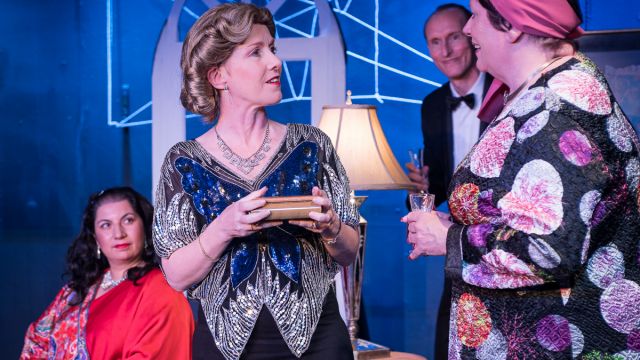Dangerous Corner
Once upon a time J.B. Preistley plays were the backbone of community theatre seasons, but of late, with the exception of An Inspector Calls, they’ve been thin on the ground. Dangerous Corner dates from 1932 and was Priestley’s first play, one of his impressionistic ‘time plays’ which explored the nature of time and presented alternative versions of the same series of events. The plot involves a missing 500 pounds, a musical cigarette box and a suicide which is eventually revealed as a murder.
Set in the country house of Robert Caplan a successful publishing firm executive, the action takes place following a dinner party. Someone produces a musical cigarette box that belonged to Robert’s dead brother Martin and questions arise as to when he was given it and who could have seen it. Everyone believes Martin committed suicide because of a missing 500 pounds, but that is not the case and as the truth emerges Martin’s image of being a free spirit is tarnished with hints of homosexuality and drug addiction. If those two subjects weren’t controversial enough to put on a stage in 1932, throw in adultery and you have a triple whammy and a guaranteed box-office success.
The play is of its time and dated, but being written as a thriller it plays like one. Kurt A. Lerps’ has retained the period setting, tunes from the period emanate from a radio along with static, while everyone sits around a very fifties-looking living room in evening dress.
Julie Moran was the strength of this production as the spinsterish Olwen, an authoritative presence with a command of the stage. Brian Hinselwood’s Charles was also a nicely drawn character performance. As Freda, the wife who eventually spills her secrets, Meg Hazelwood kept it stoic until the reveal, while Simone-Maree Dixon’s Betty displayed all the strain of marital indiscretion. Erik de Wit’s, Robert suffered somewhat by his frequent OTT outbursts and his playing of the text as melodrama. Nathaniel Young as the conflicted Gordon was believable, as was Anita Parakh-Morgan as author Miss Mockridge.
Lerps direction was fairly run-of-the-mill, but at least he kept it pacy as the revelations unfolded and Priestley’s theme of how much truth can we handle in our private lives was punched home to the full. An interesting period curiosity!
Peter Pinne
Photographer: Damien Ryan.
Subscribe to our E-Newsletter, buy our latest print edition or find a Performing Arts book at Book Nook.

